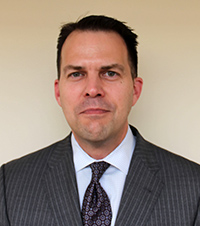
Professor of Surgery
Bioengineering, and Chemical Engineering
University of Pittsburgh
100 Technology Drive
Suite 200
Pittsburgh, PA 15219
Location: BRIDG 200 Pittsburgh
Telephone: (412)624-5324
Fax: (412)235-5110
Education:
1986 B.S. (honors) Chemical Engineering, The Johns Hopkins University, Baltimore, MD
1991 Ph.D. Chemical Engineering, University of Texas at Austin
Dr. William R. Wagner is the Director of the McGowan Institute for Regenerative Medicine as well as a Professor of Surgery, Bioengineering and Chemical Engineering at the University of Pittsburgh. He also serves as the Director of Thrombosis Research for the Artificial Heart and Lung Program, and Deputy Director of the NSF Engineering Research Center on “Revolutionizing Metallic Biomaterials”. He holds a B.S. (Johns Hopkins Univ.) and Ph.D. (Univ. of Texas) in Chemical Engineering. Dr. Wagner is the Coordinator for the Cellular and Organ Engineering track for Bioengineering graduate students, and currently teaches in the areas of biomaterials and tissue engineering.
Professor Wagner is the Founding Editor and Editor-in-Chief of one of the leading biomaterials journals, “Acta Biomaterialia”, and currently serves on the editorial boards of the “Journal of Biomedical Materials Research part A”, “Biotechnology and Bioengineering”, and the “Journal of Tissue Engineering and Regenerative Medicine”. Dr. Wagner is also a past president of the American Society for Artificial Internal Organs (ASAIO; 2010-2011) and serves on the Executive Board of the International Federation of Artificial Organs (IFAO). He is a fellow and former vice president of the American Institute for Medical and Biological Engineering (AIMBE; 2000) and has also been elected a fellow of the Biomedical Engineering Society (2007), the International Union of Societies for Biomaterials Science and Engineering (2008) and the American Heart Association (2001). He has served as Chairman for the Gordon Research Conference on Biomaterials: Biocompatibility & Tissue Engineering as well as for the First World Congress of the Tissue Engineering and Regenerative Medicine International Society (TERMIS). In 2006 he was selected to the “Scientific American 50”, the magazine’s annual list recognizing leaders in science and technology from the research, business and policy fields. In 2011 he was awarded the Society for Biomaterials Clemson Award for Applied Research. He has served on numerous NIH and NSF study sections, is a member of the NIH College of Reviewers, and has been a member of external review committees for national and international organizations focused on bioengineering and regenerative medicine. His research has generated numerous patents and patent filings that have resulted in licensing activity, the formation of a company, and University of Pittsburgh Innovator Awards in 2007, 2008, 2009 and 2010.
Dr. Wagner's research interests are generally in the area of cardiovascular engineering with projects that address medical device biocompatibility and design, tissue engineering, and targeted imaging. His research group is comprised of graduate students in Bioengineering and Chemical Engineering as well as post-doctoral fellows with backgrounds in surgery, polymer chemistry, or engineering. Dr. Wagner and his group enjoy working across the spectrum from in vitro to clinical studies. The McGowan Institute and the University of Pittsburgh Medical Center are uniquely positioned to allow such broad-based projects to flourish and complement one another. Researchers within Dr. Wagner's group are afforded the opportunity to observe first-hand the clinical successes and failures of currently employed cardiovascular devices while concurrently working on projects that attempt to describe the current modes of failure, test solutions for the current device shortcomings, or develop technologies that may find application as future cardiovascular therapies. The front-line experience afforded by the clinical environment has proven invaluable in the learning experience of group members, not to mention the input such experience has on the creative environment.
Resume

